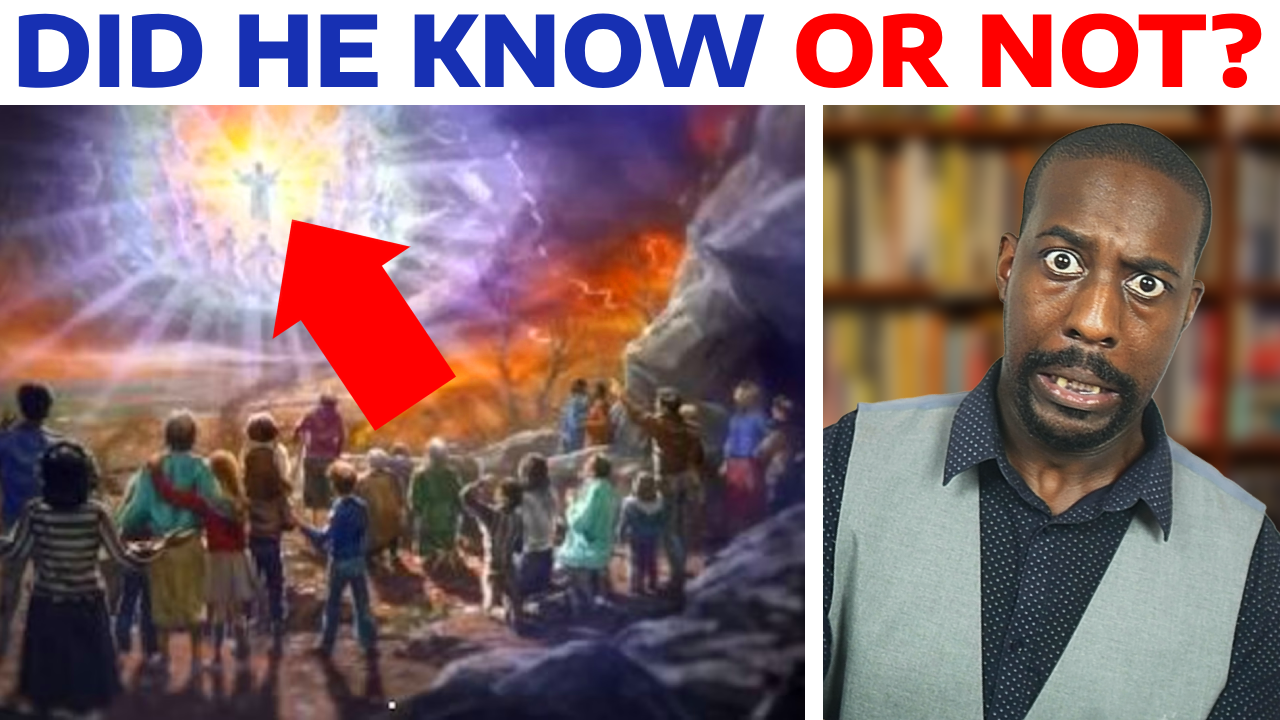Did Jesus Know The Hour Of His Return?
The question a lot of Christians struggle with is…Did Jesus Know The Hour Of His Return? You might believe Jesus is God, but a passage like Mark 13:32 totally throws you off. 
My post today will remove all that negative tension you have. Because it’s easy to avoid it, but we don’t need to do this as Christians. Jesus was doing something completely different, and I’ll walk you through it step by step.
Did Jesus Know The Hour Of His Return?
First, let’s read the passage. Then I’ll break it down. Then I’ll give you an alternative view. And then I’ll talk about the word “know” in the Bible. I’ll wrap up today’s post with two verses that build on my original case.
Mark chapter 13:32 says,
“But of that day and hour knows no man, not the angels which are in heaven, neither the Son but the Father.”
When you read this verse alone, it can be difficult to understand. But when you read the surrounding verses, you can see what Jesus is doing. He is not removing His knowledge; He is claiming Sonship and doing something far greater.
Jesus gives the people many specific signs about what will happen at His return, His return to gather His bride, the church. He explains in much detail. But then, all of a sudden, He stops and says no one knows the hour but the Father.
The Jewish Custom Jesus’ Audience Knew
Jesus was doing something the Jews understood, but many of us today do not.
It was the Jewish custom during a wedding, for the groom to go to his father’s house and build an extension. This would be where the newlyweds would live.
Think of Jesus saying in John’s Gospel that He goes to prepare a place for us. There are many rooms and mansions, etc. Once the extension was built, the tradition was the father of the groom would declare it’s time to go and get the bride.
This wasn’t because the son, the groom, didn’t know it was time, but it was the custom—the respect and honour given to the father to make the announcement. When Jesus said this, He was showing He was the Son, and the Jewish listener would understand this well.
Now you understand it well, knowing the Jewish tradition. There’s more that I want to say to help you grasp this well.
Another Interpretation About Jesus Knowing The Hour
Some Christians don’t know about this tradition and take the approach that Jesus was God, but Jesus was also man as well. Christ had two natures. Christ increased in learning, as it says in Luke chapter two. Christ got tired, He ate, He slept. Philippians chapter two says, He emptied Himself. This could be something we say, He limited Himself in His human nature. This does not cover every aspect, but it is one many Christians are happy to use.
The Jewish Custom Fits Better
But let me build more on my first answer because this is the stronger interpretation. Jesus is using the Jewish custom to present Himself as the Son of God. He would be using the word “know” here in a different context.
It would not be the context of “I don’t know” something because I’m lacking information. But it would be something different. The rest of the Bible leads us this way, and I’ll show you why.
First, there are other usages of the word “know” in the Bible.
For example, Adam “knew” Eve his wife in Genesis 4:1. Adam knew Eve before this (and after this), but Moses is using the word “know” as a euphemism for intimate relations in marriage.
In the New Testament, 1st Corinthians 2:2 uses “know” in a context of priority.
Paul says, for he determined not to know anything among you, except Jesus Christ and Him crucified.
He prioritized knowing about salvation over everything else. He was not saying the only thing he knows is whether you’re saved or not.
Said differently…He didn’t mean he didn’t know anything else about the people in Corinth.
In context, what he’s saying here is clear—all those other things were not significant.
“Know” Has Different Meanings & Context Dictates This
Words have meaning, and the context of the words helps us understand the meaning too. I want to cover two more passages which also prove Jesus wasn’t limiting His knowledge and proving He was not God.
The first example is before Christ gets crucified. This is in John 16:29-30.
His disciples said unto Him, “Lo, now speakest Thou plainly, and speakest no proverb. Now are we sure that Thou knowest all things, and needest not that any man should ask Thee; by this we believe that Thou camest forth from God.
This is the same word in Greek for “know” as in Mark 13:32. This shows context matters, as I like to say. The disciples are saying they believe Jesus knows all things. Jesus’ response is funny; He says in the next verse (31),
“Do you now believe?”
As if He expected them to know much earlier.
Then again, in John 21, listen to what Peter says to Jesus. This is after His resurrection.
This is the third time Jesus has asked Peter, “Do you love me?”
He says unto Him the third time, Simon of Jonas, lovest thou me? Peter was grieved because He said unto him the third time, Do you love me? And he said unto Him, Lord, you know all things. You know that I love you. Jesus says unto him, Feed my sheep.
Take confidence in these passages and let this breakdown help you understand this passage going forward.
If you have anything more in regards to the Bible you want me to help you understand, let me know. God bless.
Prefer To Watch?
























Recent Comments